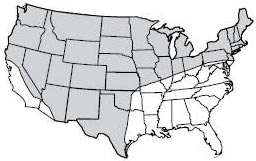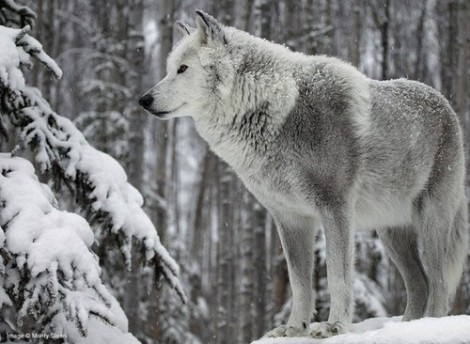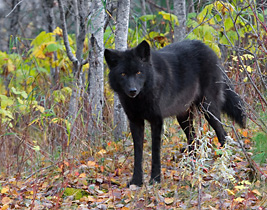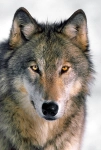The Humane Society of the United States, Born Free USA, Friends of Animals, Help Our Wolves Live (HOWL) and Their Environment are suing the USFWS and Ken Salazar over the delisting of gray wolves in the Great Lakes, which includes Wisconsin, Minnesota and Michigan. They are demanding the wolves be placed back on the Endangered Species List.
We’ve all been waiting for this news. HSUS filed an intent to sue back in October 2012 but we haven’t heard much about the lawsuit since then. This is very welcome news!
“The Humane Society of the United States and other animal welfare groups filed a lawsuit Tuesday to restore federal protections for gray wolves in the western Great Lakes region that were lifted last year.
The lawsuit, filed in federal court in the District of Columbia against the U.S. Fish and Wildlife Service and its parent agency, the U.S. Department of the Interior, said the decision to take wolves in Minnesota, Wisconsin and Michigan off the endangered list threatens the animals’ recovery throughout most of their historic range. At one time, the animals roamed nearly all of North America”.…nbcnewsonlinedotcom
Minnesota and Wisconsin rushed to hold wolf hunts soon after the USFWS delisted them. Minnesota’s actions were particularly egregious since their state plan previously included a five-year moratorium on wolf hunts if wolves were ever delisted. But in an underhanded move, the Minnesota state legislature went to work and trashed the 5 year moratorium, paving the way for almost instant wolf hunts. Adding insult to injury both states ignored the pleas from Native Americans, namely the Ojibwe people, to stop the wolf hunts. A few tribes closed their reservations to wolf hunters but because many of their reservations are fragmented the majority of the tribes weren’t able to do this and so had to watch helplessly as their brother wolf was slaughtered.
Wisconsin’s bear hounders were chomping at the bit to hunt wolves with dogs and the state’s DNR went along with it. Thankfully it was challenged in court and an injunction was issued to stop the hunting of wolves with up to six dogs per hunter. Recently that injunction was lifted paving the way for the horrible practice to be carried out by 2014.
I applaud HSUS and the other environmental groups. Wolf advocates have watched in horror as over 1000 wolves have been tortured, brutalized and killed in five state wolf hunts, since August 30, 2012. Minnesota’s hunt killed 413 wolves quickly. Wisconsin slaughtered 117 of the iconic predators and Michigan is moving with lightning speed to establish a wolf hunt.
Relisting wolves is the only way to stop this madness. Hunters have been whipped to near frenzy by right-wing crazies, who’ve demonized wolves, blaming them for everything under the sun, including eating children at bus stops. The irony is wolves are the least dangerous of the large carnivores that inhabit North America, with just two controversial fatalities in the last 100 years. Hunters OTOH kill almost a hundred people a year in hunting accidents and wound another 1000. An 11 year old boy in Oregon was wounded at a bus stop but it wasn’t by a wolf, a hunter accidentally shot him in the leg while he waited for the school bus.
I can only hope this lawsuit will be successful and wolves in the Upper Peninsula will once again be placed back on the Endangered Species list where they belong. They should stay there until the climate of hate and persecution is stamped out and the yahoos who want to inflict pain and suffering on these vital apex predators have died out. I would give that about another fifty years!
===
February 12, 2013
Wildlife Protection Groups File Suit to Restore Federal Protection for Great Lakes Wolves
A coalition of wildlife protection groups, including The Humane Society of the United States, Born Free USA, Help Our Wolves Live and Friends of Animals and Their Environment, filed suit against the U.S. Fish and Wildlife Service over its decision to remove the protections of the Endangered Species Act from gray wolves living in the western Great Lakes region.
The U.S. Fish and Wildlife Service’s most recent decision to delist wolves became effective last year, after multiple previous attempts to delist wolves were struck down by the courts over the course of the last decade. The decision threatens the fragile remnants of the gray wolf population by confining wolves to a small area in the Great Lakes region – where state wildlife managers have rushed forward with reckless killing programs that threaten wolves with the very same practices that pushed them to the brink of extinction in the first place.
“In the short time since federal protections have been removed, trophy hunters and trappers have killed hundreds of Great Lakes wolves under hostile state management programs that encourage dramatic reductions in wolf populations,” said Jonathan Lovvorn, senior vice president and chief counsel for animal protection litigation at The HSUS. “This decision rolls back the only line of defense for wolf populations, and paves the way for the same state-sponsored eradication policies that pushed this species to the brink of extinction in the first place.”
“The Endangered Species Act is popularly considered one of the most powerful conservation laws on the books, but it is rendered impotent if species are not allowed to recover fully across the breadth of their range before delisting,” said Adam Roberts, executive vice president of Born Free USA. “Simply put, the gray wolf still requires protection under the Act.”
“Wolf populations are just at the threshold of rebounding in many areas across the Great Lakes Region,” said Linda Hatfield, executive director of Help Our Wolves Live. “The recent delisting has taken the wolf back to the old days, days before the ESA, the days of state-sponsored bounty payments to hunters and trappers that were intended to eliminate wolves from the landscape.”
Following federal delisting, Wisconsin and Minnesota rushed to enact emergency regulations to allow the first public hunting and trapping seasons in the Great Lakes region in more than 40 years. The states authorized some of the most abusive and unsporting practices, including hound hunting, snares, baiting, night hunting and the use of steel-jawed leg hold traps. Together, hunters and trappers killed more than 500 wolves in these two states in less than four months. These losses are in addition to natural limiting factors and a wide range of other human-caused impacts, such as the killing of wolves by damage control agents, poachers, and, inadvertently, by automobile drivers.
The Michigan legislature recently amended state law to designate wolves as a game species, which would allow the state to authorize a trophy hunting and trapping season for wolves. There is a referendum campaign, launched by animal welfare and conservation groups and Native American tribes, in progress to place the measure on the ballot and nullify the action of the legislature.
The plaintiffs are represented in the case by Schiff Hardin, LLP and attorneys within The HSUS’ Animal Protection Litigation section. The complaint was filed in the federal district court for the District of Columbia.
Timeline
October 2012 – January 2013 – More than 500 wolves killed by hunters and trappers in Wisconsin and Minnesota.
Nov. 3, 2012 – Minnesota’s hunting and trapping season begins.
Oct. 15, 2012 – Wisconsin’s wolf hunting and trapping season begins, marking the first public hunting and trapping season in the Great Lakes region in nearly 40 years. The HSUS and others send notice of their intent to sue the USFWS over its unlawful decision to delist wolves in the Great Lakes region.
December 2012 – Michigan enacts legislation declaring the gray wolf a game animal to allow a trophy hunting season.
April 2012 – July 2012 – Wisconsin enacts legislation mandating a wolf hunting and trapping season, requiring that the state wildlife agency authorize the use of dogs, night hunting and snare and leg-hold traps. The state wildlife agency adopts regulations for the hunting and trapping of wolves in 2012-2013 via emergency rules.
July 2011 – August 2012 – Minnesota enacts legislation allowing a wolf hunting and trapping season once wolves are delisted. The state wildlife agency adopts regulations for the hunting and trapping of wolves in 2012-2013 via emergency rules.
December 2011 – The USFWS issues a final rule delisting the gray wolf population in the western Great Lakes.
September 2010 – The USFWS issues a finding that petitions to delist wolves in the Great Lakes region “may be warranted.”
July 2009 – The HSUS enters into a court-approved settlement agreement with the USFWS that reinstated federal protections for wolves in the Great Lakes region.
June 2009 – The HSUS files suit in federal court to block the delisting decision
April 2009 – The USFWS issues a final rule delisting the gray wolf population in the western Great Lakes.
September 2008 – In response to litigation filed by The HSUS and other organizations, a federal court overturned the USFWS’ Great Lakes delisting decision, thereby reinstating federal protections for gray wolves in the region.
February 2007 – The USFWS issues a final rule delisting the gray wolf population in the western Great Lakes.
2005 – 2006 – The USFWS tries to strip wolves of protection by issuing blanket permits to the state of Wisconsin that authorize state officials to kill dozens of wolves. These permits are thrown out by a federal court in response to a lawsuit by The HSUS.
January 2005 – A federal court rules that the 2003 downlisting was arbitrary and capricious, returning the wolf to endangered status.
2003 – The USFWS issues a final rule downgrading most of the gray wolves living in the lower 48 states from endangered to threatened, making it easier for people to lethally take wolves.
1978 – Gray wolf listed at the species level under the Endangered Species Act as endangered throughout the coterminous United States and Mexico, except in Minnesota, where gray wolves were listed as threatened.
1974 – Various subspecies of wolves listed as endangered under the Endangered Species Act.
1967 – Wolves listed under the Endangered Species Preservation Act of 1966 – the precursor to the Endangered Species Act.
===
Lawsuit: Put gray wolves back on endangered species list in upper Midwest
By Steve Karnowski, AP
Hunters and trappers in Minnesota and Wisconsin killed 530 wolves combined during those states’ recently concluded seasons — 413 in Minnesota and 117 in Wisconsin. The Michigan Legislature voted in December to authorize wolf hunting, which could resume as early as this fall if the state’s Natural Resources Commission approves.
“In the short time since federal protections have been removed, trophy hunters and trappers have killed hundreds of Great Lakes wolves under hostile state management programs that encourage dramatic reductions in wolf populations,” Jonathan Lovvorn, chief counsel for animal protection litigation at the HSUS, said in a statement. “This decision rolls back the only line of defense for wolf populations, and paves the way for the same state-sponsored eradication policies that pushed this species to the brink of extinction in the first place.”
http://usnews.nbcnews.com/_news/2013/02/12/16939774-lawsuit-put-gray-wolves-back-on-endangered-species-list-in-upper-midwest
===
Animal welfare groups want gray wolves protected, hunting to end
By Steve Karnowski
Associated Press
February 12, 2013
MINNEAPOLIS — The Humane Society of the United States and other animal welfare groups filed a lawsuit Tuesday to restore federal protections for gray wolves in the western Great Lakes region that were lifted last year.
The lawsuit, filed in federal court in the District of Columbia against the U.S. Fish and Wildlife Service and its parent agency, the U.S. Department of the Interior, said the decision to take wolves in Minnesota, Wisconsin and Michigan off the endangered list threatens the animals’ recovery throughout most of their historic range. At one time, the animals roamed nearly all of North America.
The Humane Society of the United States provided a copy of the lawsuit to The Associated Press before its public announcement in the afternoon. The other plaintiffs include Born Free USA, Help Our Wolves Live and Friends of Animals and Their Environment.

Gray Wolf Historic Range
Top Photo: Courtesy Tumblr
Posted in: Wolf Wars, Minnesota wolves, Wisconsin wolves, Michigan wolves
Tags: HSUS, Friends of Animals, Born Free USA, Help Our Wolves Live, Their Environment, USFWS, Department of the Interior, delisting challenge, wolf persecution, Great Lakes, gray wolves, Native Americans, Ojibwe people










 Boulder White Clouds Council
Boulder White Clouds Council Exposing The Big Game
Exposing The Big Game Footloose Montana
Footloose Montana Friends of the Clearwater
Friends of the Clearwater Lockwood Animal Rescue Center
Lockwood Animal Rescue Center Louise du Toit
Louise du Toit LUPUSLAETUS
LUPUSLAETUS Mercy For Animals
Mercy For Animals Northern Idaho Wolf Alliance (NIWA)
Northern Idaho Wolf Alliance (NIWA) Predator Friendly®- Because Wildlife Matters
Predator Friendly®- Because Wildlife Matters Project Coyote
Project Coyote Project: Wolf
Project: Wolf The Nature Conservancy
The Nature Conservancy The Ravensong Group
The Ravensong Group WildEarth Guardians
WildEarth Guardians Wisconsin Wildlife Ethic-Vote Our Wildlife
Wisconsin Wildlife Ethic-Vote Our Wildlife Wolf And Wildlife Studies: Jay Mallonee (Independent Wolf Biologist)
Wolf And Wildlife Studies: Jay Mallonee (Independent Wolf Biologist) Wolf Song of Alaska
Wolf Song of Alaska Wolves in english ! Les loups en anglais !
Wolves in english ! Les loups en anglais ! WWP's Gray Wolf Page
WWP's Gray Wolf Page Yellowstone To Yukon Conservation Initiative
Yellowstone To Yukon Conservation Initiative